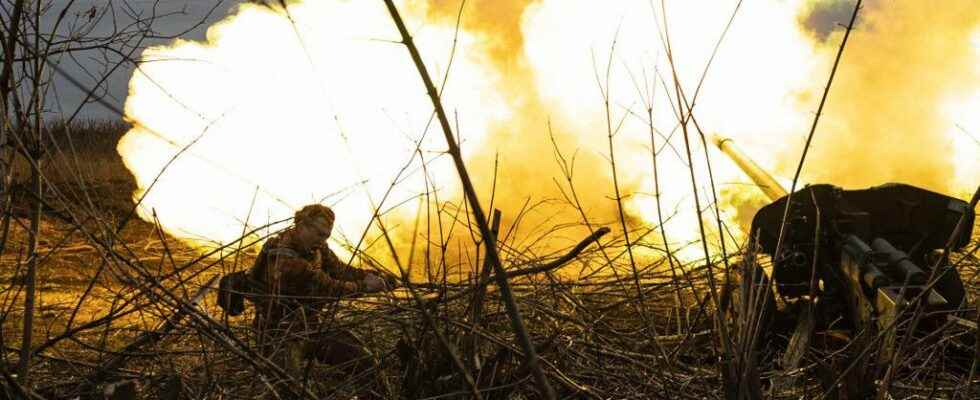Like an air of deja vu in Soledar. Russian forces announced on Friday January 13 that they had taken this small town in eastern Ukraine, before being denied a few minutes later by the Ukrainian army. Two days ago, it was the same scenario. Impatient to finally achieve military success, the boss of the Wagner private militia, Evgueni Prigojine – whose forces are on the front line in this locality – had declared victory too quickly. As a result, the hopes of the so-called “Putin’s cook” had been dashed in the process by Moscow and kyiv. The fall of the city may be imminent, but these boondoggles illustrate the paramilitary group’s impatience to show tangible results after months of fierce fighting.
“Prigojine wants at all costs to demonstrate that his Wagner group surpasses the Russian army, points out General Dominique Trinquand, military expert and former head of the French mission to the UN. He is eager to prove that he can win victories there where Russian regular forces cannot.” For nearly six months, his troops have been concentrating their efforts in an area of the Donetsk region including the towns of Soledar and Bakhmout, where the Ukrainian forces are repelling, wave after wave, the Russian assaults.
“Everything that is happening today in the direction of Bakhmout or Soledar is the bloodiest scenario of this war”, declared Wednesday January 11 the adviser to the Ukrainian presidency Mykhaïlo Podoliak, judging the Russian losses “enormous”.
Cannon fodder
“For Prigojine the stakes of this battle are vital, analyzes in a recent note Lawrence Freedman, Emeritus Professor of War Studies at King’s College London. His reputation and his claims to influence in the war depend on the conquest of the city.” With this obsession in mind, the boss of Wagner does not hesitate to sacrifice his men. According to American estimates, out of nearly 50,000 mercenaries , the paramilitary group reportedly recorded more than 4,100 killed and 10,000 injured, including more than 1,000 dead between the end of November and the beginning of December alone.
However, the group has a large reservoir of men to replace the losses: Russian prisons, where Evgueni Prigojine was filmed in September in the process of recruiting detainees. In exchange for a six-month service in Ukraine, a pardon from the Russian state is offered to them… if they survive. According to the human rights NGO Gulagu.net, at least 30,000 Russian prisoners were recruited in this way before being deployed in Ukraine. “Wagner’s forces are not very competent, judge General Trinquand. They are made up of poorly trained fighters, who are above all used as cannon fodder to exhaust the Ukrainian defenses.”
On the tactical level, the interest of taking Soledar is above all to be an essential first step in order to encircle the city of Bakhmout further south. It would also allow the Wagner Group to get their hands on the precious salt and gypsum mines present in the area. Will its leader manage to offer this trophy to Putin? “Wagner deployed all the means he could there and lost a lot of men. It would therefore be a hard-fought victory”, continues General Trinquand. According to the latest estimates, more than 60% of the city would have been destroyed.
Prigojine’s favorite target? The military staff
In the meantime, the Wagner boss does not miss an opportunity to celebrate his own merits. When announcing a Russian advance at Soledar on January 6, he was careful to recall that his units “exclusively”, and not the regular army, had “taken control of the territory”. In addition, he also thrashes the Russian general staff – his favorite target – at the slightest opportunity. “Once we have defeated our internal bureaucracy and corruption, then we will defeat the Ukrainians and NATO, he assured his men on New Year’s Eve. The problem now is that the bureaucrats and those who indulge in corruption don’t listen to us anymore because for the New Year they all drink champagne.”
Unlike the military establishment that he bullies, Prigojine regularly performs on the ground, as close as possible to the front line. On January 10, his press service posted on Telegram a photo of him in what is billed as the Soledar Salt Mine. This rivalry with the Russian army is far from being anecdotal in the context of current operations. “In an operation of this magnitude, the unity of command is important, insists General Trinquand. But we see that there is none on the Russian side. It is also bad for the power, because it shows that cracks appear within it.”
To the point of pushing Moscow to reframe its faithful lieutenant? By appointing the Chief of the Defense Staff Valéri Guerassimov on Wednesday 11 January to the post of commander of the offensive in Ukraine, replacing General Sergei Surovikin – one of Prigojine’s favorites – the Kremlin could, according to some experts, having taken the opportunity to call him to order. “It is likely that this decision, very political, was partly intended to reaffirm the primacy of the Russian Ministry of Defense”, underlines in a report the Institute for the Study of War, a Washington-based think tank. On the fringes of the battlefield, power struggles rage.
